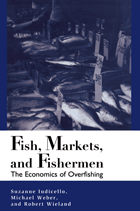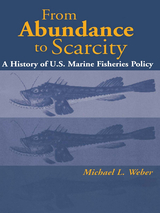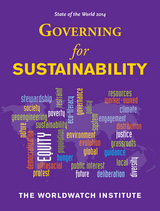

A significant number of the world's ocean fisheries are depleted, and some have collapsed, from overfishing. Although many of the same fishermen who are causing these declines stand to suffer the most from them, they continue to overfish. Why is this happening? What can be done to solve the problem.
The authors of Fish, Markets, and Fishermen argue that the reasons are primarily economic, and that overfishing is an inevitable consequence of the current sets of incentives facing ocean fishermen. This volume illuminates these incentives as they operate both in the aggregate and at the level of day-to-day decision-making by vessel skippers. The authors provide a primer on fish population biology and the economics of fisheries under various access regimes, and use that information in analyzing policies for managing fisheries. The book:
- provides a concise statistical overview of the world's fisheries
- documents the decline of fisheries worldwide
- gives the reader a clear understanding of the economics and population biology of fish
- examines the management issues associated with regulating fisheries
- offers case studies of fisheries under different management regimes
- examines and compares the consequences of various regimes and considers the implications for policy making
The decline of the world's ocean fisheries is of enormous worldwide significance, from both economic and environmental perspectives. This book clearly explains for the nonspecialist the complicated problem of overfishing. It represents a basic resource for fishery managers and others-fishers, policymakers, conservationists, the fish consuming public, students, and researchers-concerned with the dynamics of fisheries and their sustenance.

The management of coastal and ocean fisheries is highly contentious. Industry interests focus on maximizing catches while conservationists and marine scientists have become increasingly concerned about dramatic declines in fish stocks and the health of ecosystems. Besides attempting to mediate among these interests, government agencies have pursued their own agendas, which have often lagged behind shifts in scientific understanding and public attitudes about the productivity of the oceans and uses of marine wildlife.
From Abundance to Scarcity examines the historical evolution of U.S. fisheries policy and institutions from the late 19th century to the present day, with an emphasis on changes since World War II. Based on archival research and interviews with dozens of key players in marine policymaking, it traces the thinking, legislation, mandates, and people that have shaped the various agencies governing fisheries in the United States. The book:
- discusses the development of federal programs in marine biological sciences and the evolution of scientific understanding about marine wildlife populations
- describes the work of federal fisheries programs in promoting the interests of the fishing industry
- considers the response of agencies to factors such as dam-building and coastal development that have led to increased pollution and habitat loss
- examines the shifts in understanding and values that underlie major legislation including the Marine Mammal Protection Act, the Endangered Species Act, the Magnuson-Stevens Act, and the Sustainable Fisheries Act
- examines the evolving relationship between federal agencies, the fishing industry, communities, and nongovernmental conservation organizations, with an eye toward future management practice


These diverse efforts are the subject of the latest volume in the Worldwatch Institute’s highly regarded State of the World series. The 2014 edition, marking the Institute’s 40th anniversary, examines both barriers to responsible political and economic governance as well as gridlock-shattering new ideas. The authors analyze a variety of trends and proposals, including regional and local climate initiatives, the rise of benefit corporations and worker-owned firms, the need for energy democracy, the Internet’s impact on sustainability, and the importance of eco-literacy. A consistent thread throughout the book is that informed and engaged citizens are key to better governance.
The book is a clear-eyed yet ultimately optimistic assessment of citizens’ ability to govern for sustainability. By highlighting both obstacles and opportunities, State of the World 2014 shows how to effect change within and beyond the halls of government. This volume will be especially useful for policymakers, environmental nonprofits, students of environmental studies, sustainability, or economics—and citizens looking to jumpstart significant change around the world.
READERS
Browse our collection.
PUBLISHERS
See BiblioVault's publisher services.
STUDENT SERVICES
Files for college accessibility offices.
UChicago Accessibility Resources
home | accessibility | search | about | contact us
BiblioVault ® 2001 - 2024
The University of Chicago Press









